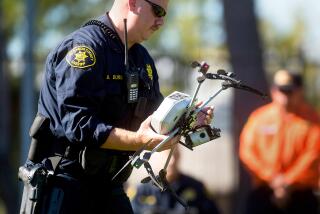Director of federal drone program targeted in ethics inquiry
Reporting from Washington — The chief of the Homeland Security Department’s drone aircraft program is facing an ethics investigation for joining the board of directors of the largest industry group promoting the use of unmanned aircraft, officials said Monday.
The internal affairs office of U.S. Customs and Border Protection is reviewing whether Tom Faller, director of unmanned aircraft systems operations, violated internal rules when he took an unpaid position as a board member of the Assn. for Unmanned Vehicle Systems International on Aug. 16.
Faller oversees eight Predator B surveillance drones that are chiefly used to help search for illegal immigrants and drug smugglers on the northern and southwestern borders.
In some cases, the drones also have been used to assist the Drug Enforcement Administration and other law enforcement agencies in criminal investigations, and to survey damage after floods and other natural disasters.
After inquiries from the Los Angeles Times last month, Faller notified the group on Nov. 23 that he was resigning from the board, said Melanie Hinton, a spokeswoman for the drone group. She said Faller did not attend any board meetings.
“Internal affairs is reviewing issues related to an employee’s outside associations,” Joanne Ferreira, a Customs and Border Protection spokeswoman, said Monday in response to questions about Faller. “We are unable to comment on any ongoing investigation.”
If found in violation, Faller could be issued a written reprimand, suspended or dismissed from government. He has held the post since April 2009. He did not respond to requests for comment.
Over the last six years, Customs and Border Protection has spent more than $240 million to buy and operate eight drones. It’s scheduled to add two more drones next summer.
“To the extent that the agency purchases any of this technology, there might be a conflict” of interest, said Stanley Brand, who was general counsel to the House of Representatives from 1976 to 1983, and is an expert on government ethics.
In September, a month after Faller joined the board, the association hosted a technology fair in the foyer of the Rayburn building, where members of the House maintain offices.
Drone aircraft companies were able to display their products and meet members of Congress. Faller’s division, the Office of Air and Marine at Customs and Border Protection, took part in the exhibit.
Based in Arlington, Va., the drone association has a $7.5-million annual operating budget, including $2 million a year for conferences and trade shows to encourage government agencies and companies to use unmanned aircraft. It has 23 board members and claims about 6,000 members around the world.
General Atomics Aeronautical Systems Inc., a private company in San Diego that builds the Predator B drone, and defense giant Raytheon Co., which develops the cameras and radar sensors used on the aircraft, each paid $10,000 in annual dues to the association in 2011, records show.
More to Read
Sign up for Essential California
The most important California stories and recommendations in your inbox every morning.
You may occasionally receive promotional content from the Los Angeles Times.











